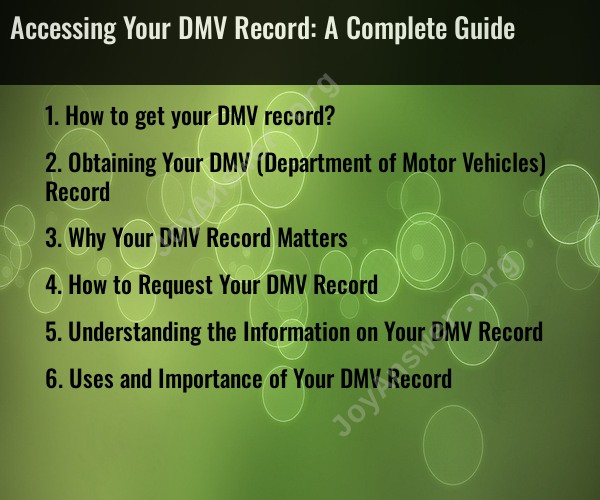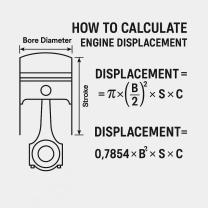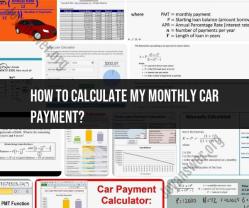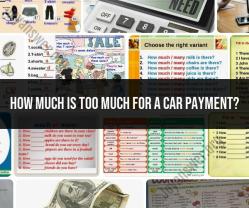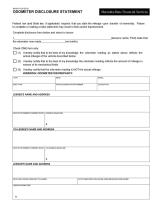How to get your DMV record?
To access your DMV (Department of Motor Vehicles) record, you typically need to request it through your state's DMV or equivalent agency. The process can vary slightly from state to state, but here's a general guide on how to get your DMV record:
Check Your Eligibility:Determine if you are eligible to request your own DMV record. In most cases, you are entitled to access your own driving record. However, if you're requesting someone else's record, you may need their written permission.
Contact Your State's DMV:Visit the official website of your state's DMV or equivalent agency. They will usually provide information on how to request your driving record online, in person, or by mail.
Choose the Type of Record:Depending on your needs, you may have the option to request different types of DMV records. Common options include:
- Complete Driving Record: This record typically includes your driving history, violations, convictions, accidents, and other relevant information.
- Certified Record: If you need an official and certified copy of your driving record for legal purposes, this option may be available.
- Insurance Record: Insurance companies often request this type of record to assess your insurance premiums and coverage.
Provide Required Information:You'll need to provide specific information to identify yourself and locate your driving record. This information may include your full name, driver's license number, date of birth, and sometimes your Social Security number.
Pay the Fee:There is usually a fee associated with obtaining your DMV record. The fee amount varies by state and the type of record you request. Be prepared to make a payment online, in person, or by mail.
Choose the Delivery Method:Depending on the state, you may have options for receiving your driving record. Common methods include receiving it by mail, email, or downloading it directly from the DMV's website.
Wait for Processing:The processing time for obtaining your DMV record can vary. Some states provide instant access to digital records, while others may take several days or weeks to process requests.
Review Your Driving Record:Once you receive your driving record, carefully review it for accuracy. Check for any errors, discrepancies, or issues that may need correction or clarification.
Use Your Driving Record:Depending on your reason for accessing your DMV record, you can use it for various purposes, including job applications, insurance rate assessment, legal matters, or personal reference.
It's essential to be aware of your rights and privacy when requesting your DMV record, and only use it for legitimate and legal purposes. If you notice any inaccuracies in your record, contact your state's DMV to have them corrected.
Keep in mind that the specific process and fees can vary by state, so it's best to visit your state's DMV website or contact them directly for the most up-to-date and accurate information on accessing your driving record.
Obtaining Your DMV (Department of Motor Vehicles) Record
Your DMV record is a document that contains all of your driving history information. It includes information such as your driving license status, traffic violations, and accidents. You can obtain your DMV record from your local DMV office or online through the DMV website.
Why Your DMV Record Matters
Your DMV record is important for a number of reasons. For example, insurance companies use your DMV record to determine your insurance rates. Employers may also review your DMV record when making hiring decisions. Additionally, your DMV record may be used to determine your eligibility for certain government programs.
How to Request Your DMV Record
To request your DMV record, you will need to provide your full name, date of birth, and driver's license number. You may also need to pay a fee. You can request your DMV record in person at your local DMV office, by mail, or online.
Understanding the Information on Your DMV Record
Your DMV record will typically include the following information:
- Your driving license status
- Traffic violations
- Accidents
- Suspensions and revocations
- Medical restrictions
Uses and Importance of Your DMV Record
Your DMV record is used for a variety of purposes, including:
- Determining insurance rates
- Making hiring decisions
- Determining eligibility for government programs
- Tracking driving history
- Investigating accidents
It is important to keep your DMV record accurate and up-to-date. If you have any changes to your driving history, such as a traffic violation or accident, be sure to report it to your DMV as soon as possible.
Here are some additional tips for obtaining and using your DMV record:
- You can usually obtain a copy of your DMV record for free online or by mail. There may be a small fee if you request a copy in person at your local DMV office.
- When reviewing your DMV record, be sure to check for any errors or omissions. If you find any errors, contact your DMV to have them corrected.
- If you are applying for a job or for certain government programs, you may be asked to provide a copy of your DMV record. Be sure to obtain a copy of your record in advance so that you have it on hand when you need it.
- You can also use your DMV record to track your own driving history. This can be helpful if you are trying to improve your driving habits or if you are concerned about your eligibility for insurance.
By following these tips, you can ensure that you are able to obtain and use your DMV record accurately and efficiently.
